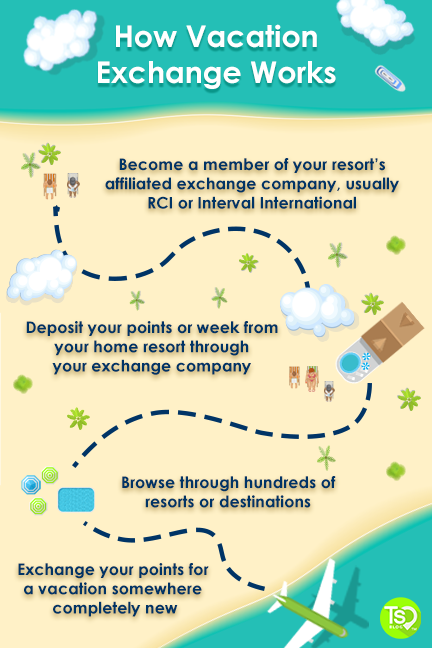In keeping with this convention, through the rest of this course I usually describe timeshare periods as "timeshare weeks" or "weeks". In addition to the purchase cost, timeshare owners also pay an annual fee for property upkeep and management. A lot of timeshare jobs also schedule one or 2 one weeks usage of each system for maintenance and repair work. Historically, numerous timeshare developers have actually used high-pressure and misleading sales techniques, with misleading and unreliable portrayals of what purchasers could get out of their timeshare ownership. The timeshare market has also had its share of unethical and unethical resort designers and operators. As a result, timesharing has a bad credibility with lots of people. Exchange value. Exchange value is the ability of a timeshare week to exchange for another timeshare week. Some weeks are more valuable and preferable than others. If you wish to regularly utilize your week for exchanging, you need to be knowledgeable about the exchange worth of the weeks you wish to get and be sure that you buy a week that will have the required value to complete these exchanges. Generally, exchanges are finished using weeks of similar worth. If the week you own is a lower value week than the areas you desire to exchange into, you need to understand this and prepare your exchanges appropriately.
To be able to prepare your exchanges, you need to able to anticipate reasonably well the exchange value of your week. The highest exchange worth predictability occurs with a points program. In a points program you understand precisely what your exchange value remains in points, and how many points are needed to complete exchanges to other resorts in which you are interested. A lot of vacation clubs also have a high degree of predictability, a minimum of for exchanges completed within the club. With repaired weeks, the usage duration is the very same every year. Hence, the part of exchange worth that is connected with the season will generally be the very same from year to year; some variations in this can happen, however, if the week periodically includes a major holiday.

With floating weeks, the exchange worth will depend on the demand for the week that you get to transfer into your account. As described in Lesson 3, in https://www.onfeetnation.com/profiles/blogs/the-best-guide-to-how-to-sell-your-timeshare many floating week resorts owners may have little or no ability to pick the week that appointed to them for exchanging. How far in advance of usage you can deposit a week. With fixed weeks, the usage dates are repaired and understood. For that reason, you can typically deposit fixed weeks with exchange companies as far ahead of Click here to find out more time as an exchange business will enable (generally 2 years). On the other hand, with drifting weeks, you frequently can't deposit weeks earlier than the resort will enable bookings to be made.

Thus, repaired weeks permit you to carry out longer variety vacation planning. Ability to divide a week. A lot of points systems will permit you to reserve systems for less than one week. Some drifting week resorts and holiday clubs will also permit you to split your use right into different weekend and weekday durations. Repaired week resorts normally have no provisions for splitting a week. Frequency of timeshare use. what are the numbers for timeshare opt-outs in branson missouri. The majority of timeshare programs are based on yearly usage of the timeshare. If your getaway schedule or choices are such that you would not utilize a timeshare every year, you should acquire a system in a program that accommodates this situation.
How Can I Get My Timeshare Cleaned When I'm Gone - Questions
As the name indicates, with an EOY ownership your usage right occurs every other year. Purchase expenses for such a system are correspondingly less. Annual costs for an EOY are generally handled in one of two methods: 1) you pay a complete yearly fee, however only for the year for which you have an use right; or 2) you share of a complete cost every year. Points programs likewise work well if you don't vacation every year, considering that the points will typically bring over to the next year if you do not use them. Some getaway clubs will likewise permit you to rollover a holiday use into the next year.
With a deeded property, you belong owner of the property; if the residential or commercial property supervisor ends up being defunct, you will still own your share of the home. On the other hand, when the operator of a right-to-use residential or commercial property ends up being defunct, your only claim on the property is as one of lots of other lenders. Likewise, in a deeded residential or commercial property, the homeowners association can generally replace the resort supervisor if they choose. In a right-to-use property, the owner and operator are normally the very same entity or are closely associated entities (how to cancel a wyndham timeshare contract). You need to likewise think about the years of use staying on a right-to-use contract, especially as it compares to your long-range getaway strategies.
If you just plan to vacation for about ten years, purchase of a right-to-use with about 10 years of remaining life may be quite practical and affordable. In a lockout system, the layout of the system enables the unit to be divided into 2 subunits, each of which can be inhabited independently. Typically, a two-bedroom View website lockout system usually divides into a hotel system and a one-bedroom system. The lockout feature considerably increases your flexibility in utilizing the unit. For instance, one year you might inhabit the unit as a complete two-bedroom system. Another year, if there were fewer people in your party, you might decide to inhabit just the one-bedroom portion and deposit the hotel system with an exchange business - why would you ever buy a timeshare.